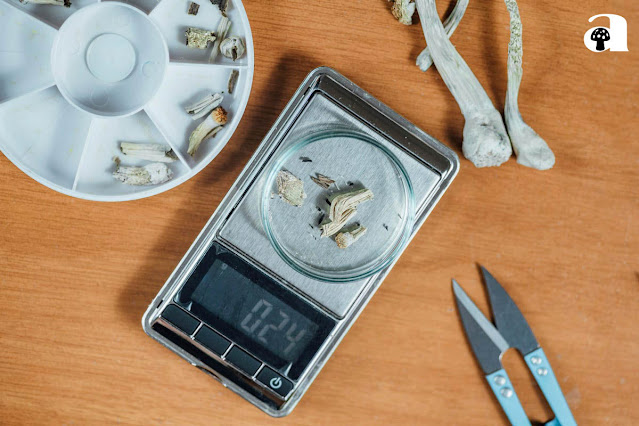Microdosing mushrooms has grown increasingly popular over time, with many individuals reporting how it has helped manage anxiety, depression and other psychological conditions more effectively.
We will explore the benefits and risks of microdosing mushrooms, the science behind it, as well as some tips for those interested in trying it out for themselves.
What Is Microdosing Mushrooms?
Microdosing mushrooms involves taking subperceptual doses of psychedelic mushrooms every few days - typically one-tenth to one-fifth of an equivalent full dose - which will not lead to full-blown hallucinogenic trips but instead provide subtle shifts in consciousness.
Microdosing mushrooms has been practiced for decades, yet it has only recently seen increased interest from individuals exploring its possible therapeutic uses. Although much is unknown about microdosing mushroom consumption, numerous individuals claim that it has helped improve both mental health and cognitive performance.
How Does Microdosing Mushrooms Work?
Although the exact mechanism behind microdosing mushrooms remains elusive, it is generally accepted that active compounds found in psychedelic mushrooms such as psilocybin and psilocin work by stimulating serotonin receptors within the brain.
Serotonin is an important neurotransmitter responsible for managing mood, anxiety, and stress levels. By binding to serotonin receptors on your cells, psilocybin and psilocin could potentially modulate these functions and promote feelings of wellbeing.
Microdosing Mushrooms- Pros and Cons
There may be numerous potential advantages to microdosing mushrooms; however, further research needs to be completed in order to fully appreciate all these advantages. Here are some commonly reported advantages:
1. Improved Mood
Many individuals have reported that microdosing mushrooms has helped them manage symptoms of depression and anxiety. This may be attributed to how psilocybin and psilocin work on serotonin receptors in the brain to induce feelings of well-being while alleviating stress.
2. Increased Creativity
Many have reported that microdosing mushrooms has helped them unlock their creative potential, perhaps as a result of the subtle shift in consciousness that results from microdosing, which allows individuals to step outside the norm and approach problems differently.
3. Increased Focus and Productivity
Many individuals report that microdosing mushrooms has helped them stay focused and productive throughout their day, possibly due to psilocybin and psilocin's effects on the prefrontal cortex, which plays a part in cognitive functions like attention and working memory.
4. Improved Emotional Intelligence
Individuals report that microdosing mushrooms has helped them develop greater emotional intelligence - the ability to understand and manage our emotions - due to the introspective and reflective experience provided by microdosing mushrooms.
Microdosing Mushrooms While microdosing mushrooms is usually safe, there may be potential risks and side effects to keep in mind when microdosing them.
Here are some of the more prevalent risks related to microdosing:
1. An Increase in Anxiety
While microdosing mushrooms has proven helpful in managing anxiety for some individuals, some individuals may experience an increase in anxiety or paranoia as a side effect of microdosing mushrooms. While this effect is more likely at higher dosage levels, microdosing still poses this possibility.
2. Trouble Sleeping
Microdosing mushrooms may lead to difficulty sleeping for some people, particularly if taken too late at night.
As both psilocybin and psilocin have stimulating effects that make sleeping difficult, taking these substances may make falling asleep more challenging than intended.
3. Potential for Addiction
While no evidence suggests microdosing mushrooms is addictive, there is the possibility that individuals could become psychologically dependent upon this practice. It is therefore wise to use caution and moderation when microdosing mushrooms; seek professional assistance as necessary if necessary.
Tips for Microdosing Mushrooms
Are You New to Microdosing Mushrooms Looking to try microdosing mushrooms? Here are a few pointers that should help get the ball rolling:
1. Begin Low
To start microdosing mushrooms safely and responsibly, start off slowly. Aim to take around one-tenth to one-fifth of a full dose initially in order to minimize adverse side effects while getting an understanding of how this practice affects you.
2. Keep a Journal
Journaling your microdosing experiences can help you stay on top of your progress and detect patterns or trends in terms of mood, productivity or creativity.
3. Practice Self-Care
As with any form of therapy, microdosing mushrooms requires practicing self-care - whether that means getting enough restful sleep, following a healthy diet and engaging in regular physical exercise or meditation. This could include getting enough shuteye and taking steps such as regular yoga practice to stay in good physical and mental condition.
4. Know Your Source
It is crucial that when microdosing, one understands their source. Some strains of mushrooms may be more potency than others - to ensure a successful microdosing experience it is recommended to purchase from reliable vendors and conduct sufficient research prior to making a purchase.
5. Get Professional Help
If you are experiencing mental health difficulties, it is essential that you seek professional advice before trying microdosing mushrooms. While microdosing mushrooms may help some individuals, this practice should never replace medical treatment as intended.
If you are considering microdosing mushrooms, it's essential that you start slowly, keep a journal of your experiences, practice self-care and know where your source comes from before seeking professional advice if needed. While microdosing mushrooms might not be suitable for everyone, it can provide valuable tools in therapy and self-improvement for some individuals.
Always be mindful that legality for microdosing mushrooms varies by location and it's important to be aware of potential risks and side effects associated with microdosing mushrooms.
With proper mindset and approach, microdosing mushrooms can be an effective and safe way to boost mood, creativity and overall well-being.
Are You Eager to Discover Microdosing Mushrooms?
Are You curious about microdosing mushrooms? There are numerous resources available both online and in print - books, articles, online forums and communities, mental health professionals with experience using this practice, etc.
Doing your research and approaching microdosing mushrooms with an open mind will enable you to gain an in-depth knowledge of its benefits and risks, giving you the power to make informed decisions regarding your mental health and wellbeing.
Read and Research Resources Now.
If you are curious to gain more knowledge on microdosing mushrooms, here are some helpful resources:
"The Third Wave" (https://thethirdwave.co/) is a comprehensive online resource dedicated to microdosing and other forms of psychedelic therapy.
"Microdosing Psychedelics: A Practical Guide to Upgrade Your Life" by Paul Austin (https://microdosingbook.com/) provides practical guidance and advice for safely and effectively microdosing psychedelics.
"Psychedelic Science Review" (https://psychedelicreview.com/) is an online publication dedicated to covering and analyzing psychedelic research and therapy in depth.
"MAPS" (https://maps.org/) is a non-profit organization committed to advancing research and education on psychedelic therapy.
Erowid (https://erowid.org/) is an online resource providing information and resources regarding the effects and risks associated with various psychoactive substances, including mushrooms.
These resources can assist in keeping you well-informed and making smart decisions about microdosing mushrooms for yourself.
FAQ's
How often should I microdose mushrooms?
Most individuals who microdose mushrooms do so once or twice each week; however, dosing frequency can vary based on personal goals and other considerations.
Can microdosing mushrooms be dangerous?
While taking microdoses of mushrooms is generally safe, there may be certain risks and side effects you should be wary of, such as increased anxiety or difficulty sleeping.
How can I know if microdosing mushrooms is right for me?
Microdosing mushrooms isn't for everyone, and it is essential that you carefully consider your personal situation when considering this option. If interested, consulting with a mental health professional or conducting further research could prove useful.
How should I measure a microdose of mushrooms?
A microdose typically represents about one-tenth to one-fifth of a full dose, although this will depend on both individual preference and strain used. When starting with low doses and gradually increasing over time.
Can I Microdose Mushrooms If I Take Medication?
Before microdosing mushrooms if you are currently taking medication, it is advisable to consult a health care professional first. As psychotropic compounds may interact with certain drugs and be potentially unsafe when microdosed; make sure it's right for you by consulting a healthcare provider beforehand.
What are the risks of microdosing mushrooms?
A: While microdosing mushrooms remains unknown, potential risks include adverse psychological reactions, interactions with other medications or substances and addiction or dependence risks.
Will microdosing mushrooms help with depression or anxiety?
Although many individuals have reported that microdosing mushrooms has eased symptoms associated with depression and anxiety, it should be remembered that microdosing should never replace professional medical or psychological advice.
How can I tell if microdosing mushrooms is right for me?
Making the decision to microdose mushrooms should be approached carefully and responsibly, taking time for research, seeking medical advice if necessary and starting slowly so as to gauge your individual reactions.
What kind of mushrooms should I use for microdosing?
For microdosing purposes, typically used are psilocybin mushrooms containing psychoactive substances called psilocybin. It's essential to source them from reliable suppliers who offer them in suitable species and doses for individual use.
Microdosing mushrooms is legal depending on where it takes place; in certain countries like the Netherlands and Jamaica, for instance, such psychedelics have been legalized; while others such as the US prohibit possession and use of mushrooms containing psilocybin. Before making an attempt at microdosing mushrooms in any capacity, be sure to research local laws first.
How often should I microdose mushrooms?
Microdosing mushrooms varies depending on an individual's goals and needs, with some choosing to microdose every few days while others opting for once weekly microdosing sessions or less. It is important to take note of how your body responds to microdosing so you can tailor its frequency as necessary.
What dosage should be used when microdosing mushrooms?
Aiming for between 0.1 to 0.5 grams of dried mushrooms as the ideal dosage range can depend on individual factors like body weight, tolerance levels and sensitivity levels. With that being said,
How should I prepare the mushrooms for microdosing?
Microdosing with mushrooms typically involves grinding them into a fine powder and measuring out their desired dosage with a scale. You could also try creating tea or tinctures using mushrooms; these methods may offer less precise dosage control.
Can I safely microdose mushrooms while taking medication?
Before undertaking microdosing mushrooms while taking any medication, it's wise to consult a healthcare provider first. Certain antidepressant or antipsychotic medicines may interact with psychedelics and increase your risk of adverse reactions.
What should I do if I experience adverse side effects when microdosing mushrooms?
If you experience any adverse reactions after microdosing mushrooms, it is vital that you seek medical assistance as soon as possible and discontinue this practice immediately. Furthermore, speaking to someone like a mental health professional or trusted friend or family member may also prove invaluable in discussing your experience.
Q: What Are the Advantages of Microdosing Mushrooms?
A: Benefits of microdosing mushrooms include enhanced mood, creativity, productivity and focus. Others report reduced anxiety or depression symptoms; increased empathy and connectedness with others and enhanced relationships with them.
Q: How Can I Microdose Mushrooms?
A: To microdose mushrooms effectively, begin with a low dose and gradually increase it over time. Some individuals prefer using psilocybin capsules or edibles while others opt for raw mushrooms; it's important to know your source as well as practice self-care when microdosing mushrooms.
Q: How Long Will Microdosing Mushrooms Last?
A: Microdosing mushrooms may last from several hours to several days depending on dose, individual factors such as metabolism and tolerance.
Notable Conclusions
While microdosing mushrooms has proven successful for many individuals, its use does not come without potential risks and side effects. Some may experience psychological side-effects from meditation practice, including anxiety, paranoia or disorientation. Others may become too dependent upon it or find that it interferes with their daily lives.
Microdosing mushrooms should also be approached with caution; not everyone may find them beneficial due to possible side effects and risks, including those with bipolar disorder or schizophrenia.
Furthermore, much is still unknown about the long-term impacts of microdosing mushrooms. Though initial studies have provided promising data, more research needs to be conducted in order to fully comprehend both benefits and risks of this practice.
Microdosing mushrooms is a complicated and intricate practice which should be undertaken with care and caution. If you decide to microdose yourself, be sure to do it responsibly, with emphasis placed upon safety, education and self-awareness.
Microdosing mushrooms has grown increasingly popular over the past several years, with many people reporting positive effects on their mental health and overall wellbeing. It is essential that individuals approach this practice carefully and seek professional assistance if required.
No matter your decision regarding mushroom microdosing, it is vitally important that you put your mental health and wellbeing first. With the appropriate mindset and approach, you can find all of the tools necessary for living a happier, healthier, more satisfying life.
Microdosing mushrooms has gained increasing interest, with many people reporting its many benefits. It is, however, essential to approach this practice with caution and care as long-term effects of microdosing remain unclear.
When considering microdosing mushrooms, it's essential to first do your research and start with low doses - always prioritizing safety and well-being above anything else. Also remember that microdosing shouldn't replace professional medical or psychiatric advice or treatment. If you decide to try microdosing mushrooms, it's essential that you go into it with an open mind and willingness to learn.
While microdosing mushrooms can be powerful tools for personal development and self-discovery, they cannot provide instant solutions for all your problems.
Remind yourself always to respect the power of these substances and use them responsibly and safely.
Microdosing should be approached with extreme care and precaution as there remain unknown long-term effects of this practice. Prioritize safety and wellbeing over any perceived gains; consult a healthcare professional if any questions or concerns arise.
Remember that microdosing mushrooms is not meant as an alternative treatment option and is best approached with an open mind and willingness to learn.
Microdosing mushrooms is an increasingly popular trend, with individuals reporting improved mood, creativity, focus and productivity as a result of this practice. While it does carry some risks and side effects that should be considered prior to microdosing mushrooms for mental health management and overall quality of life improvement purposes.
But as always, it should be approached carefully with professional assistance if necessary.




.jpg)
.jpg)
.jpg)
.jpg)
.jpg)





.jpg)





